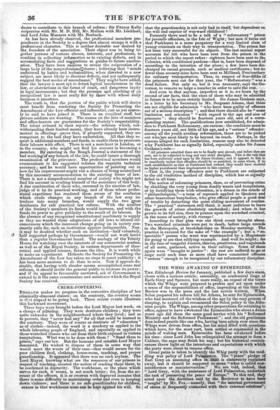CRI ME-FOSTERING.
ENGLAND makes no progress in the corrective discipline of her criminally-disposed classes ; on the contrary, the country seems in tint respect to be going back. Three recent events illustrate this backward movement.
Three boys were brought before the Lord Mayor last week, on a charge of pilfering. They were destitute children ; they were quite unknown in the neighbourhood where they lived ; and as to parents, they "never had any" for all that could be learned to the contrary. They were of course as destitute of " education " as of clothes—indeed, the word is a mockery as applied to the whole labouringpeople of England, and especially as applied to those wretched classes who are from their birth exposed to vicious temptations. What was to be done with them ? "Send them to prison," says our law. But the humane and sensible Lord Mayor demurred. He wished to sdispose of them in some way that would meet the wants of their case—that would secure for the poor children food, clothing, house-room, teaching, and proper guardianship. It appeared that there was no such asylum. The Lord Mayor, knowing what are the resources of our prisons in respect of teaching, scouted the notion of sending them there, to be confirmed in depravity. The workhouse, or the place which serves for such, it seems, is not much better; for, from the ac- count of the officers, it is so overrun with depraved inmates that there is seine difficulty in maintaining order and even in keeping down violence ; and there is no safe guardianship for children, ecause in that workhouse none can be kept against his will. So
that the guardianship is not only bad in itself, but dependent on the will and caprice of wayward childhood !
Formerly there used to be a talk of a " reformatory" prison for juvenile offenders, in the Isle of Wight ; but now it turns out that Parkhurst is a mere purgatory for a very limited class of young criminals on their way to transportation. The prison has not been very successful for its objects. The last annual report accounts for 105 who have been sent from the prison in the period to which the report refers : eighteen have been sent to the Colonies, with conditional pardons—that is, have been disposed of according to the intention of the place ; a few have been dis- charged on casual grounds, such as medical certificates ; but no fewer than seventy-nine have been sent to Millbank Penitentiary for ordinary -transportation. Thus, in respect of four-fifths of the prisoners sent out for that year, the " Reformatory " was a dead failure. Not only so, but it was necessary, says the Go- vernor, to remove so large a number in order to save the rest. And even to that asylum, imperfect as it is, we learn by the second of our facts, that the class of those who may be admitted in future is to be more strictly limited. Sir James Graham says, in a letter by his Secretary to Mr. Sergeant Adams, that those are not eligible for admission "who have been guilty of offences not of a serious description " ; and that there should also be " some limitation and selection " " with regard to the age and size of prisoners " : they should be fourteen years old, and of a corre- sponding stature. The qualifications now established, for admis- sion to Parkhurst Reformatory, are curious : the candidate must be fourteen years old, not little of his age, and a " serious " offender: among all the youth needing reformation, those are to be picked out who are most likely to be beyond its reach. Perhaps, in the reasons alleged for such limitations, reasons may also be detected why Parkhurst has so signally failed, especially under Sir James Graham's rule— "All prisoners admitted there are to be finally sent abroad; and before they are sent, are to be subjected to long and very strict discipline. This is the rule that has been uniformly acted upon by Sir James Graham; and it appears to him to be manifestly unjust that offenders should be so punished, in cases where, if no such establishment as that at Parkhurst bad existed, they would have received no higher punishment than imprisonment in this country." —That is, the young offenders sent to Parkhurst are subjected to the old vindictive method of discipline, which has so signally failed in all time.
The notion of reforming prisoners, then, or of preventing crime by shielding the very young from deadly wants and temptations, or by fortifying them with education, is a dream in the minds of " philanthropists,"—a term of reproach applied to Quakers and other benevolent busybodies, who give official people a good deal of trouble by disturbing the quiet sliding movement of routine. The " practical" statesmen still think it most judicious to leave the growth of crime absolutely unchecked ; and when it has grown to its full size then to pounce upon the wretched criminal, in the name of society, with revenge! According to that plan was our third event brought about. Two wretched criminals were put to death, before large crowds in the Metropolis at breakfast-time on Monday morning. The practice is excused for the sake of "the example" ; but a " re- spectable " person who went was reprimanded by a Magistrate for going to see that edifying example. And well he might ; for in the face of vengeful Justice, thieves, prostitutes, and vagabonds of all sorts, gathered, active in their callings. Some of these again were " brought to justice" : the rest are suffered to go at large until such time as more shall have committed offences " serious " enough to be recognized by our reformatory discipline.


























 Previous page
Previous page